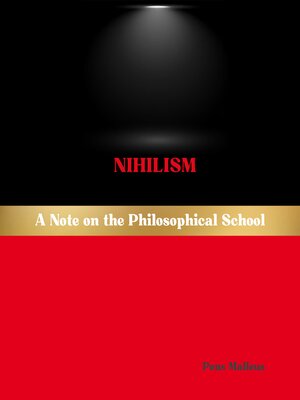Nihilism
audiobook (Unabridged) ∣ A Note on the Philosophical School · Western Philosophical Schools
By Pons Malleus

Sign up to save your library
With an OverDrive account, you can save your favorite libraries for at-a-glance information about availability. Find out more about OverDrive accounts.
Find this title in Libby, the library reading app by OverDrive.



Search for a digital library with this title
Title found at these libraries:
| Library Name | Distance |
|---|---|
| Loading... |
This audiobook is narrated by a digital voice.
To speak of nihilism is to open a door into a house without foundations—a place where meaning, value, and truth are neither fixed nor given, but rather interrogated, dismantled, and, in many cases, left unresolved. This book is an exploration of that house. It traces the shadow of nihilism not only as a philosophical doctrine but also as a lived experience, a historical force, and a cultural undercurrent that has shaped—and continues to shape—our modern and postmodern sensibilities.
Nihilism is often misunderstood. It is caricatured as mere despair, or dismissed as intellectual provocation without substance. Yet its philosophical depth is immense. It asks questions many would rather avoid: What is the value of values? If there is no objective meaning to life, how should we live? What becomes of truth when its foundations are pulled away? To face these questions is not an act of destruction for destruction's sake, but rather a confrontation with the limits of inherited belief systems.
This book is written for the curious reader: the philosopher, the student, the skeptic, the seeker. It does not demand prior expertise, only a willingness to question and reflect. It avoids jargon where possible, but does not dilute the complexity of the ideas. Each chapter invites you to engage critically and openly with thinkers who have wrestled with the void—and, in some cases, found light beyond it.
In the end, nihilism may not offer comfort. But it does offer clarity. It reveals what lies beneath our assumptions, and in doing so, calls us to create new foundations—or to learn how to live without them. Whether as a danger to avoid or a challenge to embrace, nihilism compels us to think more deeply about what it means to live, to believe, and to value.
This is that journey.







